#664 Bring cash and raincoat
The Survival Guide to British Columbia
by Ian Ferguson
Victoria: Heritage House, 2019
$19.95 / 9781772032840
Reviewed by Patricia E. Roy
*
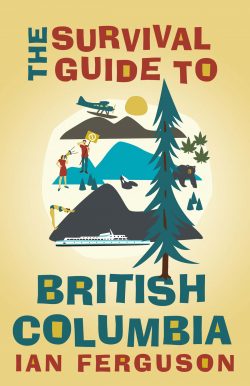 The Survival Guide to British Columbia offers some useful information about the province but it is unlike a Boy Scout handbook or a Ministry of Tourism, Arts and Culture publication. Ian Ferguson seeks to let readers “experience British Columbia with minimal damage” to their health and well-being as he admonishes that merely “setting foot in B.C.” risks “safety and security” through its location, people, politics, climate, fashions and so forth (p. 9). Ferguson admits that his only qualification for writing the book is that he survived his first three visits to the province and now lives in Victoria.
The Survival Guide to British Columbia offers some useful information about the province but it is unlike a Boy Scout handbook or a Ministry of Tourism, Arts and Culture publication. Ian Ferguson seeks to let readers “experience British Columbia with minimal damage” to their health and well-being as he admonishes that merely “setting foot in B.C.” risks “safety and security” through its location, people, politics, climate, fashions and so forth (p. 9). Ferguson admits that his only qualification for writing the book is that he survived his first three visits to the province and now lives in Victoria.
Ferguson rightly warns that his statistics are both accurate and made up “for comedic effect” and that readers take his advice at their own risk. People who ignore his cautions, take some recommendations literally and not as satire, or do not assess them with a large grain of salt may be in trouble. Driving “like a local” does not mean “impeding as much pedestrian traffic and endangering as many bicyclists as possible” (p. 19), nor would it be wise to make “serious coin” by becoming “a con artist or ‘Howe Street Investment Adviser’” (p. 141). Yet, there is also sound advice: if coming to British Columbia (at least to the coast), Ferguson advises the reader to acquire a rainproof jacket.
Because Ferguson lives in Victoria, examples from that city abound. The book is designed to be up-to-date, even completing the move of Russell Books to new quarters across the street while it was only in progress. Curiously, Ferguson refers to the traditionally named Georgia Strait, not to the Salish Sea.
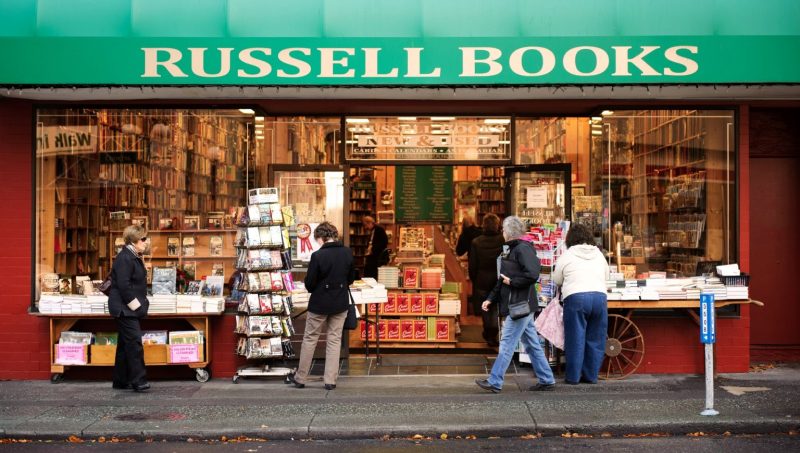
While there is much information and commentary on Victoria and Vancouver, Ferguson knows that British Columbia extends beyond its southwest corner. One effort to be geographically inclusive, however, will annoy some readers and insult residents of Kamloops, the interior city that he uses as a running gag. According to Ferguson, “No one in Kamloops qualifies as ‘sophisticated’” (p. 110). Yet, he concedes that he has only driven through on the Trans-Canada Highway. Had he ventured off the highway (a by-pass) he would discover that art and culture in Kamloops consist of more than graffiti. A short detour leads to an art gallery with a national reputation and to an attractive museum and archives that reveal the rich history of the city and region.
Ferguson also makes fun of the Welsh. To support his observation that Oak Bay is “one of the last of the surviving outposts of the British Empire,” he claims it has seen signs denying service to “Ne’er-do-wells and Welshmen” (p. 26). If such a sign existed, surely Human Rights officers would have ordered its withdrawal.
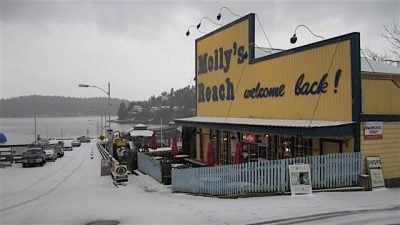
Several chapters include lists of such enterprises as restaurants, book stores, and institutions of higher education. Over several pages, Ferguson conveys his disdain for salmon as a food, expresses his delight that several restaurant chains founded in British Columbia now have franchises elsewhere, and says that British Columbia is the best place he has found for traditional diners. Of his nine favourite diners, only the Northern Star Café in Smithers and Molly’s Reach in Gibsons are outside Vancouver Island or the Lower Mainland. A list of nine favourite bookstores, however, has only one from Vancouver, but one each from Terrace, Prince George, Kelowna, Sechelt, Parksville-Qualicum and three in greater Victoria.
The chapter on institutions of higher education will not replace the Maclean’s or similar guides. The provincial universities and information about numbers of faculty and students and prominent alumni are there. In contrast, few regional colleges, an important part of the province’s system of post-secondary education, are noted although some private trades and technical schools, notably those offering unique courses such as bartending and dog grooming, are named. There is, however, some sensible advice: beware of private training schools not registered with the government’s Private Training Institutes Branch.
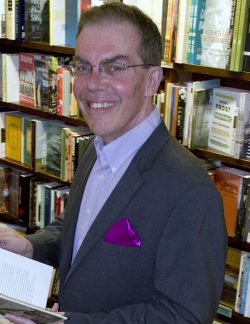
No guide to British Columbia could omit politics and Ferguson has a chapter on “Governance through Shenanigans.” There are brief biographies of several premiers including, inevitably, Amor De Cosmos and Bill Vander Zalm. Yet Richard McBride, premier for a dozen years, is not mentioned and recent premiers barely get passing mention.
An appendix provides some multiple choice questions (and a correction key) about British Columbia. In keeping with the book’s tone, a few suggested answers are serious; most are inserted for their comic potential.
Caveats aside, The Survival Guide to British Columbia offers some smiles (except to the Welsh and Kamloopsians), delightful and timely cartoon-like illustrations by Jacqui Thomas, and a piece of very practical advice to newcomers: “bring cash.”
*
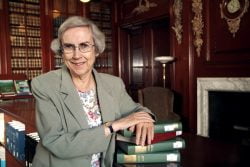
Patricia E. Roy, a native of British Columbia, is professor emeritus of History at the University of Victoria where she taught Canadian history for many years. Her own research has been mainly in the field of British Columbia history and she is best known for her trilogy of books on the responses to Chinese and Japanese immigrants: A White Man’s Province (1989); The Oriental Question (2003), and The Triumph of Citizenship (2007). All were published by UBC Press. Her longstanding interest in B.C.’s political history resulted in Boundless Optimism: Richard McBride’s British Columbia (UBC Press, 2012). Her latest book is The Collectors: A History of the Royal British Columbia Museum and Archives (Victoria: Royal British Columbia Museum, 2018).
*
The Ormsby Review. More Books. More Reviews. More Often.
Publisher and Editor: Richard Mackie
The Ormsby Review is a journal service for serious coverage of B.C. books and authors, hosted by Simon Fraser University. The Advisory Board consists of Jean Barman, Robin Fisher, Cole Harris, Wade Davis, Hugh Johnston, Patricia Roy, David Stouck, and Graeme Wynn. Scholarly Patron: SFU Graduate Liberal Studies. Honorary Patron: Yosef Wosk. Provincial Government Patron since September 2018: Creative BC
“Only connect.” – E.M. Forster
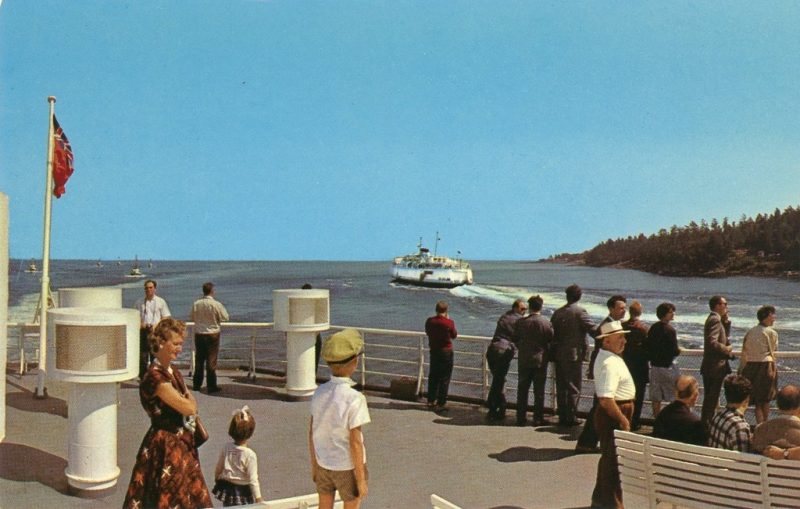
One comment on “#664 Bring cash and raincoat”
Comments are closed.